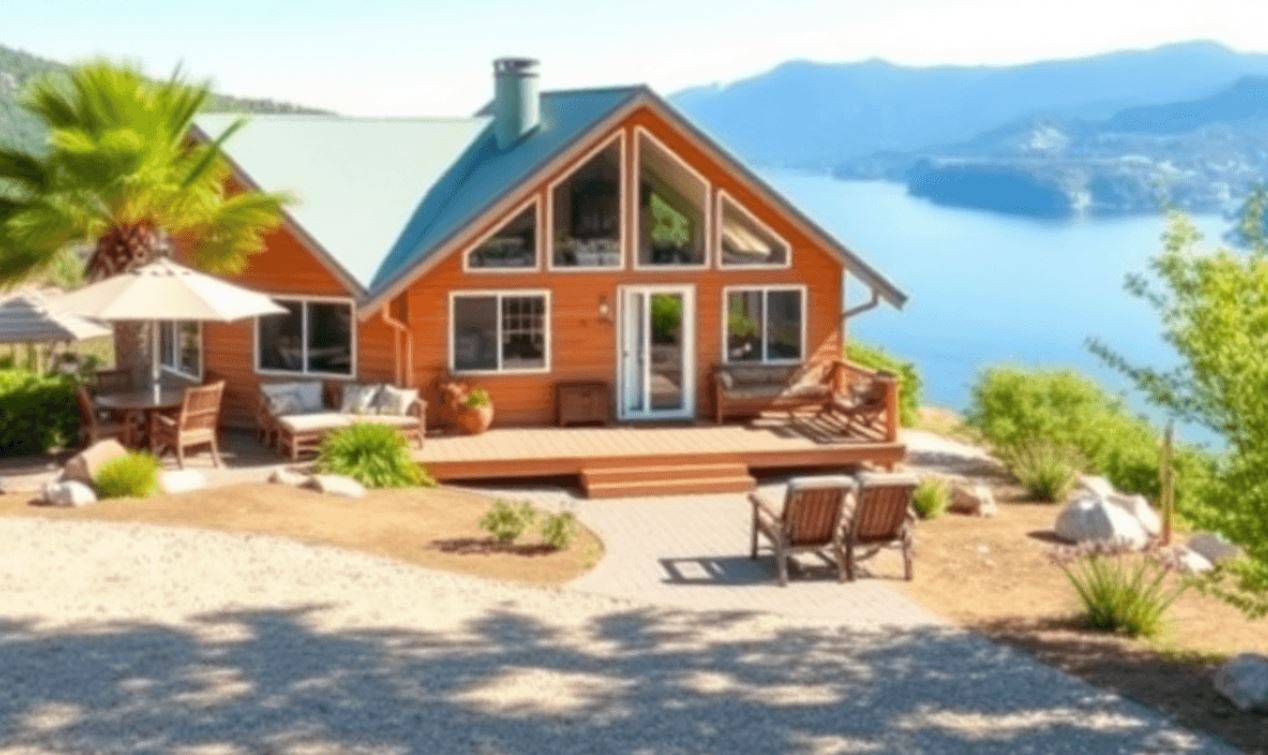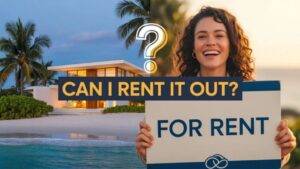You’re planning your dream vacation, looking at rental listings, and watching a lot of money go to someone else. Sound familiar? Millions of vacationers face this reality every year, spending a lot on temporary stays without getting any long-term value.
The traditional way of renting vacation homes has a big problem – you’re paying high prices for a temporary experience. Each booking is money that could be invested in your future instead of paying off another property owner’s mortgage.
But what if you could turn those rental costs into an investment? Owning a vacation home is a great alternative to renting. You’ll learn about:
- How to build equity while enjoying your vacations
- Ways to make money from your property
- Tax benefits only property owners get
- Strategies to make vacation home ownership work for you
Let’s find out why owning a vacation property might be the smartest financial decision for your future trips.
The Financial Downsides of Renting Vacation Homes
Renting vacation homes has its downsides, especially when it comes to your finances and long-term wealth building. Every time you book a vacation rental, you’re basically paying off someone else’s mortgage without getting any benefits of ownership.
Here’s what you’re missing out on when renting:
- No Equity Building: Your rental payments help the property owner build equity while you only get memories
- Increasing Rental Costs: Popular vacation spots see annual price hikes, with peak season rates going up 10-15% every year
- Higher Prices During Busy Times: Holiday seasons and peak times often have rental rates that are double or triple
- Limited Availability: It’s becoming harder to secure your preferred dates, especially in popular places
- Extra Fees and Hidden Costs: Additional charges like cleaning fees, service fees, and security deposits can add up quickly
The lack of customization options also means you’re stuck with the owner’s choice of furnishings, appliances, and amenities. You can’t make improvements or modifications to better suit your needs, forcing you to compromise on comfort and convenience.
The unpredictability of rental availability can disrupt your vacation plans. Many desirable properties book up 6-12 months in advance, limiting your flexibility and forcing you to plan far ahead or settle for less desirable options.
Benefits of Owning a Vacation Home
Purchasing a vacation home transforms your getaway expenses into a valuable investment opportunity. Real estate historically appreciates over time, building substantial equity as property values rise. A vacation property in desirable locations can see significant value increases, particularly in popular tourist destinations or emerging markets.
Key Financial Benefits:
- Your property can generate substantial rental income during periods you’re not using it
- Real estate appreciation creates long-term wealth building
- Tax deductions on mortgage interest and property taxes reduce your annual tax burden
The rental income potential adds a powerful dimension to vacation home ownership. You can offset your mortgage payments, maintenance costs, and other expenses by renting your property during peak seasons. Many vacation homeowners earn enough rental income to cover their annual property expenses while still enjoying several weeks of personal use.
Tax Advantages You Can Claim:
- Mortgage interest deductions up to $750,000 of debt
- Property tax deductions up to $10,000
- Depreciation deductions when using the property as a rental
- Operating expense deductions for rental-related costs
Beyond financial benefits, you gain the freedom to customize your space exactly as you want it. You can store personal items, decorate to your taste, and create a true home away from home that reflects your style and meets your family’s specific needs.
The Costs and Commitments Involved in Ownership
Purchasing a vacation home requires significant financial preparation. The initial investment starts with a down payment ranging from 10% to 25% of the purchase price, depending on your lender’s requirements. You’ll need to factor in closing costs, typically 2-5% of the loan amount, which include:
- Title insurance
- Property appraisal fees
- Legal documentation costs
- Loan origination fees
The ongoing expenses create a substantial monthly commitment:
- Mortgage payments with interest rates often higher than primary residences
- Property taxes varying by location
- Homeowner’s insurance premiums
- Additional landlord insurance if you plan to rent
- HOA fees in certain communities
Maintenance costs represent a significant portion of vacation home ownership:
- Regular lawn care and landscaping: $100-200 monthly
- HVAC system maintenance: $200-300 annually
- Roof inspections and repairs: $300-1,000 annually
- Plumbing and electrical maintenance: $500-1,500 annually
- Furniture and appliance replacement: $1,000-3,000 annually
If you choose professional property management, expect to pay 14-35% of your rental income for their services. These companies handle:
- Guest communications
- Cleaning services
- Regular property inspections
- Emergency maintenance
- Booking management
However, the true cost of vacation home ownership extends beyond the purchase price. It’s essential to understand the true cost of home ownership which includes these expenses to maintain the property’s value and ensure a positive ownership experience.
Tax Implications of Owning a Vacation Home
The IRS applies specific rules to vacation home ownership that can significantly impact your tax situation. Understanding these guidelines helps you maximize tax benefits while staying compliant.
The 14-Day Rule
A notable tax advantage exists if you rent your vacation home for 14 days or less per year. Under this rule, you don’t need to report the rental income to the IRS – making it tax-free income. You can still deduct property taxes and mortgage interest as itemized deductions on Schedule A.
Extended Rental Periods
When you rent your property for more than 14 days, different tax implications apply:
- You must report all rental income
- Personal use days affect available deductions
- Rental expenses become deductible on Schedule E
- You can deduct operating expenses proportional to rental days
Mixed-Use Properties
The IRS considers your vacation home a mixed-use property if you both rent it and use it personally. Tax treatment varies based on usage patterns:
- Personal use > 14 days or 10% of rental days: Property is primarily personal
- Personal use < 14 days or 10% of rental days: Property is primarily rental
Deduction Limits
The Tax Cuts and Jobs Act caps property tax and mortgage interest deductions:
- Combined state and local tax deductions limited to $10,000
- Mortgage interest deductible on loans up to $750,000
- Home equity loan interest only deductible if used for property improvements
Renting vs Owning: Convenience, Flexibility, and Personal Situation Considerations
Renting vacation properties gives you the freedom to explore different destinations without being tied to a single location. You can experience beach houses in Hawaii one year and mountain cabins in Colorado the next. This variety allows you to match your vacation spot with your current interests and preferences.
Key advantages of renting:
- No property maintenance responsibilities
- Freedom to switch locations
- No long-term financial commitments
- Built-in amenities and services
- Zero responsibility for repairs or upgrades
Benefits of ownership:
- Complete control over property modifications
- Personal touches in décor and furnishings
- Familiar environment for family gatherings
- Storage space for vacation gear
- Building memories in a consistent location
Property ownership demands significant time investment for maintenance, repairs, and management. You’ll need to handle everything from seasonal maintenance to emergency repairs. Many owners hire property managers to handle these tasks, adding to the cost but reducing personal time commitment.
Renting puts these responsibilities on someone else’s shoulders. You simply book, enjoy your stay, and leave. This hands-off approach appeals to travelers who prefer spending their time planning activities rather than managing property issues.
Your lifestyle plays a crucial role in this decision. If you value routine and creating a home away from home, ownership might align with your goals. If you seek adventure and new experiences, renting provides the flexibility to satisfy your wanderlust.
When Does Buying Make Sense? Evaluating Your Personal Situation
Buying a vacation home becomes a smart financial decision when specific factors align with your lifestyle and goals. Here’s what to consider before making the leap:
Vacation Frequency
- You visit the same destination 3+ times per year
- You spend at least 2-4 weeks annually in the location
- You have a strong connection to the area and plan to return regularly
Financial Readiness
- You have a stable income to cover monthly mortgage payments
- Your savings can handle a 20-25% down payment
- You maintain an emergency fund for unexpected repairs
- Your debt-to-income ratio stays below 43% after the purchase
Property Management Capability
- You live within driving distance for regular maintenance checks
- You have reliable local contacts for emergency repairs
- You’re comfortable managing rental bookings and guest communications
- You can afford professional property management fees (14-35% of rental income)
Long-term Vision
- The location aligns with your retirement plans
- The property type matches your future needs
- The area shows potential for real estate appreciation
- You plan to hold the property for 5+ years
Your decision to buy should reflect a balance between these factors. A vacation home purchase makes sense when you’re financially prepared, committed to the location, and ready to handle property responsibilities.
Conclusion
The decision between renting and owning a vacation home isn’t a one-size-fits-all choice. Your personal circumstances, financial health, and long-term goals shape the path that’s right for you.
Renting offers flexibility and minimal responsibility – perfect for those who value variety in their vacation destinations or aren’t ready for property ownership commitments. Yet, the appeal of building equity, potential rental income, and tax advantages make vacation home ownership an attractive investment strategy for many.
Key considerations before making your decision:
- Your financial stability and ability to handle both expected and unexpected costs
- The frequency of your visits to your chosen destination
- Your comfort level with property management responsibilities
- Your long-term retirement and investment goals
The question “Why rent when you can own?” transforms into “Should you rent or own?” The answer lies in your unique situation, preferences, and readiness to take on the responsibilities of vacation home ownership. A thoughtful evaluation of these factors will guide you toward the choice that best serves your lifestyle and financial future.








